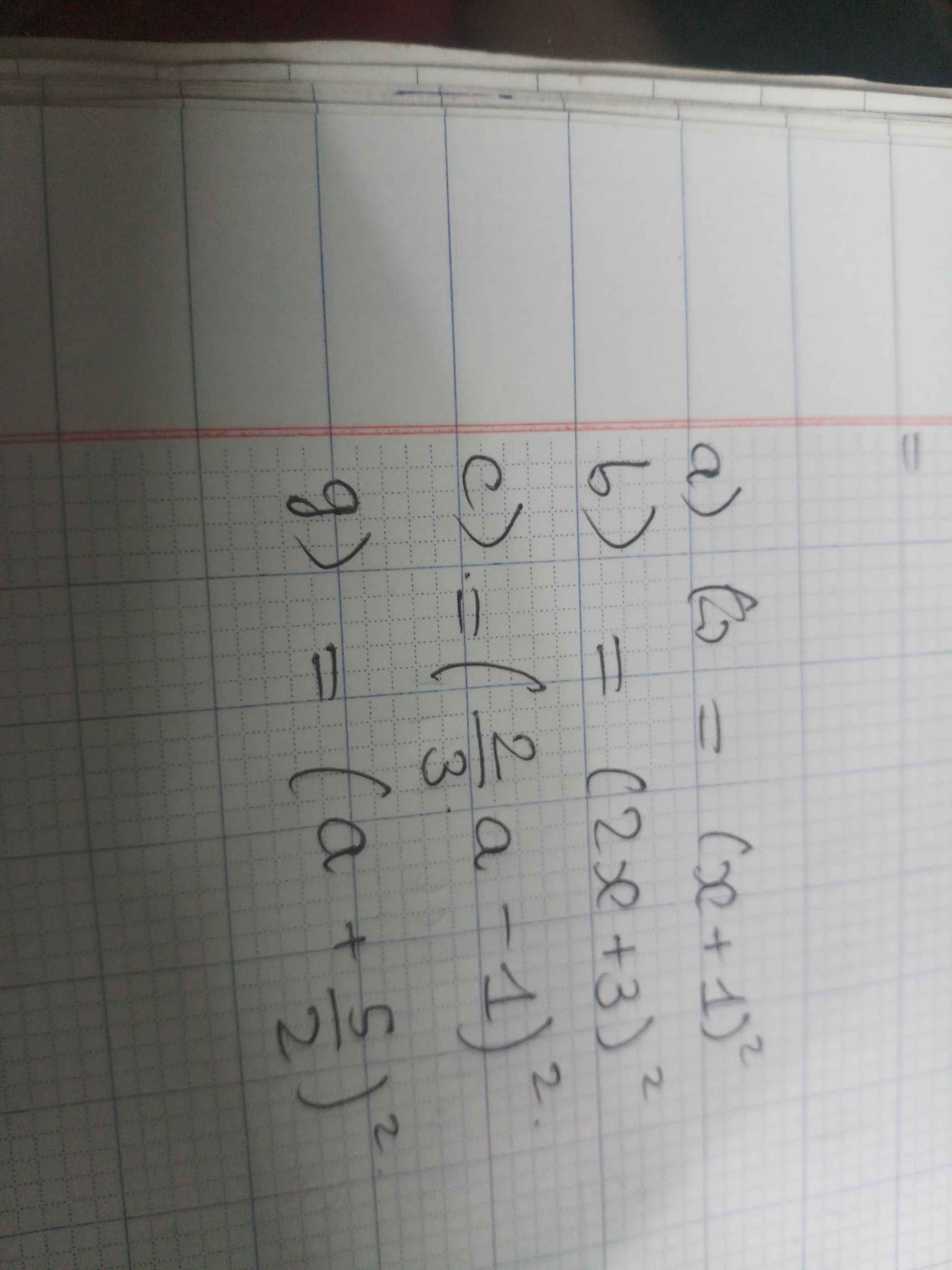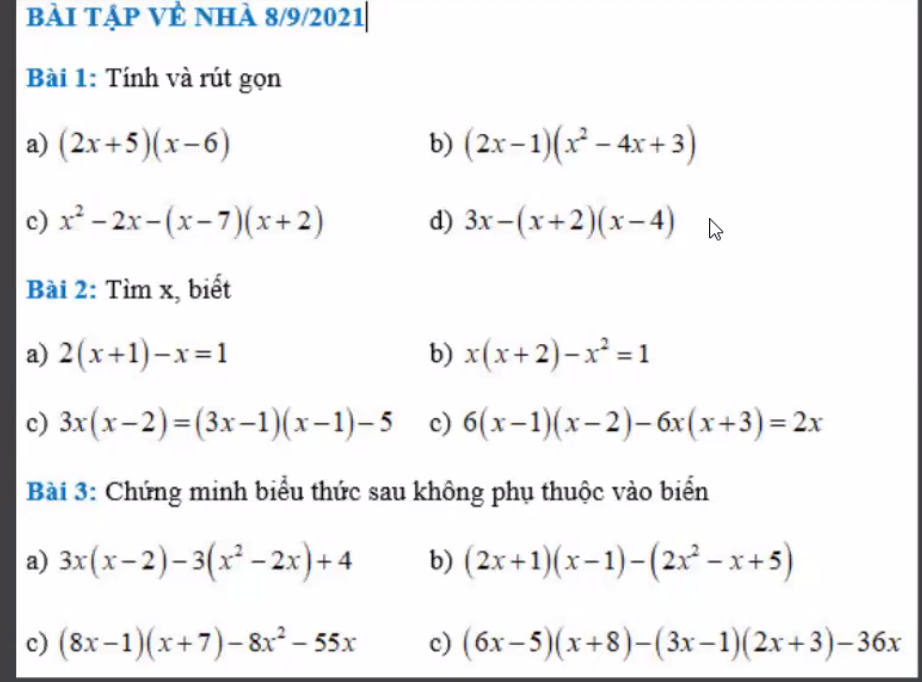 Giúp mình câu này với được ko?!?
Giúp mình câu này với được ko?!?
Hãy nhập câu hỏi của bạn vào đây, nếu là tài khoản VIP, bạn sẽ được ưu tiên trả lời.


Làm thế này nhé
(2x-6)y+x-3=18
(2x-6)y+x-18-3=0
(2x-6)y+x-21=0
sau đó bạn rút gọn nhé, ta làm như sau
2(x-3)=0
=> 2x= 2 x 3
=> x=3 nhé
giúp mình llàm câu b với nhé đã k cho bạn rồi nha
b, y = \(\frac{23}{x+7}\)

\(x^2+2x+1=x^2+2\cdot1x+1^2=\left(x+1\right)^2\)
\(4x^2+12x+9=\left(2x\right)^2+2\cdot3\cdot2x+3^2=\left(2x+3\right)^2\)
\(\dfrac{4}{9}a^2-\dfrac{4}{3}a+1=\left(\dfrac{2}{3}a\right)^2-2\cdot\dfrac{2}{3}\cdot1a+1^2=\left(\dfrac{2}{3}a-1\right)^2\)
\(a^2+5a+\dfrac{25}{4}=a^2+2\cdot2,5a+2,5^2=\left(2,5+a\right)^2\)

1: \(\Leftrightarrow x-2-7x+7=-1\)
=>-6x+5=-1
hay x=1(loại)
3: \(\Leftrightarrow\left(x+2\right)\left(x-1\right)-\left(x+1\right)\left(x+3\right)=4\)
\(\Leftrightarrow x^2+x-2-x^2-4x-3=4\)
=>-3x=9
hay x=-3(loại)
4: \(\Leftrightarrow x^2+2x+1-x^2+2x-1=3x\cdot\dfrac{x+1-x+1}{x+1}\)
\(\Leftrightarrow4x=\dfrac{6x}{x+1}\)
\(\Leftrightarrow4x^2+4x-6x=0\)
\(\Leftrightarrow4x^2-2x=0\)
=>2x(2x-1)=0
hay \(x\in\left\{0;\dfrac{1}{2}\right\}\)

Bài 1:
a) (2x+5)(x-6)=2x2+5x-12x-30=2x2-7x-30
b) (2x-1)(x2-4x+3)=2x3-8x2+6x-x2+4x-3=2x3-9x2+10x-3
c) x2-2x-(x-7)(x+2)=x2-2x-x2+7x-2x+14=3x+14
d) 3x-(x+2)(x+4)=3x-x2-2x-4x-8=-x2-3x-8
Bài 2:
a) 2(x+1)=x-1
⇒2x+2=x-1
⇒2x+2-x+1=0
⇒x+3=0
⇒x=-3
b) x(x+2)-x2=1
⇒x2+2x-x2=1
⇒2x=1
⇒x=0,5
c) 3x(x-2)=(3x-1)(x-1)-5
⇒3x2-6x=3x2-x-3x+1-5
⇒3x2-6x-3x2+x+3x-1+5=0
⇒-2x+4=0
⇒-2x=-4
⇒x=2
d) 6(x-1)(x-2)-6x(x+3)=2x
⇒6(x2-x-2x+2)-6x2-18x-2x=0
⇒6x2-6x-12x+12-6x2-18x-2x=0
⇒-38x+12=0
⇒-38x=-12
⇒x=\(\dfrac{6}{19}\)

\(70:\frac{2}{7}=\frac{70}{1}:\frac{2}{7}=\frac{70}{1}\times\frac{7}{2}=\frac{490}{2}=\frac{235}{1}=235\)

Okie, xinh nên giúp :3 Đùa thui
a/ 5 nguồn mắc nối tiếp \(\left\{{}\begin{matrix}\xi_b=5.\xi=5.4=20\left(V\right)\\r_b=5r=5.0,2=1\left(\Omega\right)\end{matrix}\right.\)
b/ \(R_D=\dfrac{U^2_{dm}}{P_{dm}}=\dfrac{36}{6}=6\left(\Omega\right);I_{dm}=\dfrac{P_{dm}}{U_{dm}}=\dfrac{6}{6}=1\left(A\right)\)
Đèn sáng bình thường \(\Rightarrow I_2=I_D=I_{dm}=1\left(A\right)\)
\(\left(R_1ntR_B\right)//\left(R_2ntR_D\right)\Rightarrow R_{td}=\dfrac{\left(R_1+R_B\right)\left(R_2+R_D\right)}{R_1+R_B+R_2+R_D}=\dfrac{\left(2+4\right)\left(6+6\right)}{2+4+6+6}=4\left(\Omega\right)\)
c/ \(I=\dfrac{\xi_b}{r_b+R_{td}}=\dfrac{20}{1+4}=4\left(A\right)\)
\(I=I_1+I_2\Rightarrow I_1=I-I_2=4-1=3\left(A\right)\Rightarrow P_1=I_1^2.R_1=3^2.2=18\left(W\right)\)
\(m_{Cu}=\dfrac{A_{Cu}.I_B.t}{F.n}=\dfrac{64.3.\left(32.60+10\right)}{96500.2}=...\left(g\right)\)




